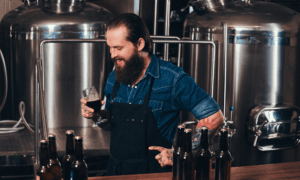On Tuesday, June 28, Sensiba proudly sponsored the San Francisco Business Times’ annual Food and Beverage Innovators Panel to discuss the trends, fads, and innovations driving today’s specialty foods market. On the panel, five major players in the Bay Area specialty food industry discussed the ways in which their company remains relevant in the marketplace as well as some of the key challenges that they face on a regular basis. Here is a list of the Top 10 takeaways from this intriguing event:
1. Authenticity & transparency
There has been a strong pull toward health, sustainability and fresh in the food industry, and the importance of transparency is rapidly growing. This holds especially true for meat alternatives like Impossible Foods. The challenge is to be transparent with every ingredient and all production processes, without sacrificing the authentic taste consumers are accustomed to. Another challenge is keeping up with legal compliance and reporting of “organic” foods, a challenge that Urban Remedy says led them to hire a full-time quality assurance manager at their facility.
2. Target consumers — Millennials
Technology-driven and health-conscientious, millennials are dictating what becomes trendy in the marketplace. F’real Foods perfectly targeted this demographic by incorporating hip touch screens on their milkshake blenders. Without using any of their own marketing power, a F’real Foods blender showed up on social media, and the result was a massive line of anxious teens waiting to order the blended milkshake concoction. The lesson — instead of the traditional method of pushing products out, finding ways to pull consumers in and publicize a product on their own social media is a key factor for marketing.
3. Follow the health trends
Processed foods are out, and healthy “fast foods” are in. Powered by millennials and supported by parents with growing children, every company wants to tap into this vast market. Fresh, sustainable, healthy, and fast — that’s what is selling. Urban Remedy has gone from a small, private kitchen to opening several storefronts selling pre-made, ready to go food and juices. Even F’real Food, traditionally a milkshake producer, is searching for healthy alternatives to reach a wider market. People are caring about what goes in their bodies, and the need for producing healthy food is becoming a necessity for staying in business.
4. Breaking into retail stores
If it tastes good, consumers will naturally want it. With that mentality, both Hodo Soy and Casa Sanchez broke into retail stores by letting managers, owners, and even employees, sample their products. Whether it was at a farmer’s market or directly at the store location, as long as it tasted great their product would sell. From there, Hodo Soy formed partnerships with Bay Area restaurants and even with Chipotle, which uses Hodo Soy tofu for their sofritas.
5. What about packaging?
Packaging was once a mere way to preserve and present food, but now sustainable packaging has become an essential element in attracting consumers. Urban Remedy sees this as another way consumers, in particular millennials, connect with their plant-based food and juices. However, they have found difficulty in maintaining freshness using sustainable packaging for a product with an already short shelf-life. All of the panelists expressed a desire to pursue more sustainable packaging but finding a quality product has been an ongoing challenge. *Hint, hint to any packaging innovators out there.
6. Find the right investors
It’s not good enough to receive funding; they need to be the right investors too. Food companies need to establish what the product emphasizes, the requirements to maintain that quality, and the timeline scaling to market with their investors. For Urban Remedy, that meant sticking to fresh, sustainable juices, both as a liquid and a package. To Impossible Foods, it was laying out a timeline with long-term goals where research shortcuts are not possible.
7. Keep it simple
Sometimes simplicity is the best policy. Hodo Soy sticks to producing only tofu and has come to be associated with quality in a market where 80% is controlled by only two companies. This philosophy can also be applied to the management of the company. For example, Urban Remedy founder, Neka Pasquale, found herself buried in too much paperwork and hired a CEO so she could focus on her passion and specialty—developing healthy juices and meals.
8. The blend of tech and food
When food and technology meet, innovation is bound to happen. Impossible Foods’ plant-based hamburger was made possible from breakthroughs in research and technology. Similarly, F’real Foods developed a packable milkshake and blender to serve-up authentic drinks for whole-hearted indulgence. Technology is just as important as the food itself when it comes to creating products that break food industry norms.
9. Change and innovation
Casa Sanchez said it best — there’s both external and internal innovation. What that means for each company is very different and depends on its mission statement as a company. For Hodo Soy, it means rebranding tofu from soy, a meat substitute used only in ethnic cuisine, to a vegetable that simply tastes great for any style of cooking. To F’real Foods, innovation is encouraging risks and celebrating failure. They believe in taking risks in the development stage, learning from their mistakes, and encouraging this mentality to keep the creative juices flowing.
10. It’s all about relationships
When you have a whole aisle of competitors in every store, every advantage to dominate more of that space helps. Casa Sanchez is creating that advantage by building close relationships with retail stores. Their goal is to not just be known by each store’s staff, but also to have their biggest advocates be the employees.
We serves a vast variety of food and beverage innovators. If you want to find out more about how our Firm can help grow your specialty foods business, contact us.

















